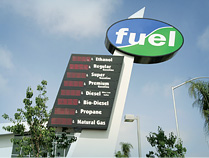About Clean Cities and Communities

Our Mission
Clean Cities and Communities advances the nation’s environment, energy security, and economic prosperity through collaboration with communities by building partnerships with public and private stakeholders that create equitable deployment of clean transportation solutions for all.
The United States consumes approximately 20 million barrels of petroleum per day, about three-fourths of which is used for transportation. Transportation also has a significant economic impact on American businesses and families, accounting for nearly one-sixth of the average household's expenses (second only to housing). Improving efficiency and reducing costs in this sector can make a notable impact on our economy. Increasing the use of alternative fuels, electric vehicles, and advanced vehicle technologies can also reduce the emissions that impact our air quality and public health.
Who We Are
More than 75 DOE-designated coalitions work in communities across the country, collectively covering about 93% of the U.S. population. Coalitions implement alternative and renewable fuels, electric vehicles, idle-reduction measures, efficiency improvements, new mobility choices, and emerging transportation technologies. CC&C coalitions are composed of businesses, fuel providers, vehicle fleets, state and local government agencies, and community organizations. Each coalition is led by an on-the-ground coalition director who tailors projects and activities to capitalize on the unique opportunities within their communities. Nationwide, nearly 16,000 stakeholders are part of CC&C coalitions. Together they are transforming local and regional transportation markets through their collective efforts.
Clean Cities and Communities coalitions advance clean transportation through a set of partnership principles:
- Collaborative: CC&C is built on a foundation of people working with people to achieve collective goals.
- Transformative: CC&C uses high-impact strategies to transition the transportation market to a clean energy future.
- Knowledgeable: CC&C delivers objective technical expertise rooted in U.S. Department of Energy research and coalition insights from real-world applications.
- Inclusive: CC&C engages with urban, suburban, and rural communities, including underserved and overburdened communities.
- Credible: CC&C has more than 30 years of experience as the go-to experts by leveraging a national network of more than 75 DOE-designated coalitions and a unique understanding of local needs
What We Do
Clean Cities and Communities coalitions build bridges between national priorities and local needs through their 30 years of experience deploying clean transportation technologies and deep connections to both the federal government and local partners. At the national level, VTO develops partnerships, funds projects, and provides technical assistance, analysis, information resources, and online tools and data. At the local level, coalition staff leverage these resources to provide expertise, resources, and tools to strategically advance clean transportation in the regions they serve. CC&C utilizes a broad set of approaches that improve transportation efficiency at the local, state, and national levels. CC&C activities include:
- Building partnerships with public- and private-sector transportation stakeholders
- Developing unbiased and objective information resources covering alternative fuels, electric vehicles, advanced vehicle technologies, new mobility choices, and other strategies that improve transportation efficiency and reduce costs
- Maintaining interactive, data-driven online tools to help stakeholders evaluate options and achieve goals
- Sharing best practices and lessons learned to inform choices and build a strong national network
- Using robust processes to collect and maintain relevant data sets to inform transportation decision making
- Working with industry partners and fleets to identify and address technology barriers and research needs
- Providing technical assistance to help fleets deploy alternative fuels, electric vehicles, advanced vehicle technologies, and energy efficiency measures
- Engaging communities to understand local priorities and develop community-driven solutions
- Seeding local alternative-fuel markets through projects that deploy vehicles and fueling infrastructure
- Leveraging people and resources to encourage private-sector investment, resulting in successful implementation of advanced transportation, fueling infrastructure, and charging equipment development projects.
Coalition staff offer technical assistance and hands-on problem-solving support to fleets and communities, working to deploy clean transportation fuels and technologies based on a unique understanding of local needs. Thriving on a culture of collaborative change, coalitions harness more than 30 years of experience to continue moving our transportation systems into the future.
Why We're Here
Clean Cities and Communities dates back to the Alternative Motor Fuels Act of 1988 and the Clean Air Act Amendments of 1990. These laws, which encouraged the production and use of alternative fuel vehicles (AFVs) and the reduction of vehicle emissions, led to the creation of the Alternative Fuels Data Center (AFDC) in 1991. The AFDC's initial objective was to collect, analyze, and distribute data used to evaluate alternative fuels and vehicles.
In 1992, the enactment of the Energy Policy Act of 1992 (EPAct) required certain vehicle fleets to acquire AFVs. Subsequently, DOE created CC&C in 1993 to provide informational, technical, and financial resources to EPAct-regulated fleets and voluntary adopters of alternative fuels and vehicles.
DOE's VTO facilitates national-level administration of CC&C through its Technology Integration Program and provides technical resources. The AFDC continues to be the clearinghouse for these resources. Its sister website, FuelEconomy.gov, provides consumers with information on fuel economy, emissions, and energy impact of light-duty vehicles, based on vehicle data from the U.S. Environmental Protection Agency.